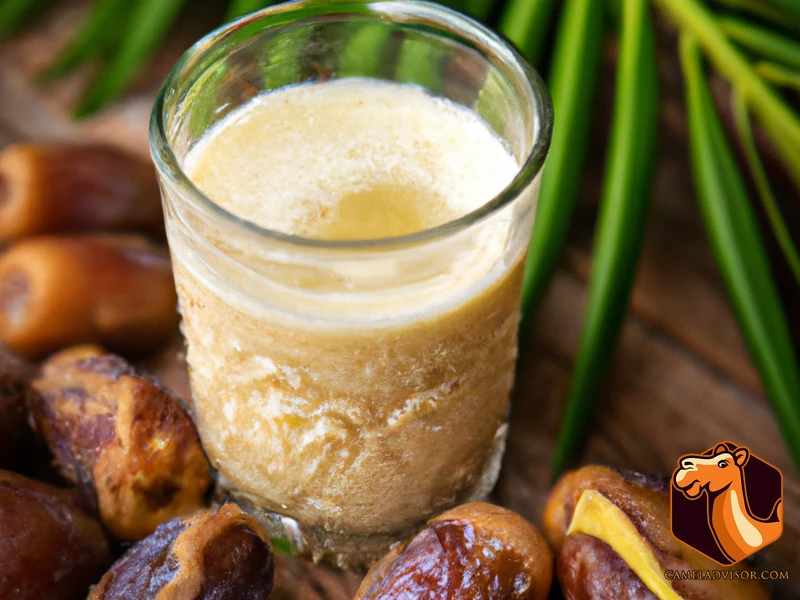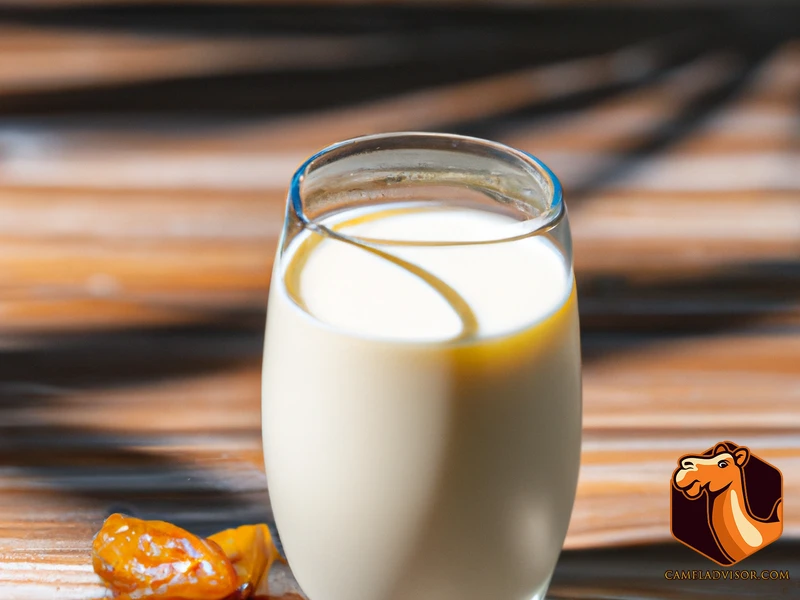When it comes to boosting our immune system, we often turn to conventional methods such as taking vitamins or supplements. However, have you ever considered camel milk as a potential immunity booster? Yes, you read it right – camel milk! Despite being less popular than cow’s milk, camel milk has been consumed for centuries in certain parts of the world due to its numerous health benefits. In this article, we’ll explore the little-known yet powerful benefits of this unique milk for our immune system and overall health.
Contents
- What is Camel Milk?
- Camel Milk and Immune System
- Other Health Benefits of Camel Milk
- How to Incorporate Camel Milk into Your Diet
- Conclusion
-
Frequently Asked Questions
- What does camel milk taste like?
- Is camel milk safe for people with lactose intolerance or dairy allergies?
- How does camel milk compare to other non-dairy milk alternatives?
- Can camel milk help with weight loss?
- What is a good serving size of camel milk?
- Is it safe to consume raw camel milk?
- Does camel milk have any side effects?
- Is organic camel milk available?
- Can camel milk prevent or cure diseases?
- Where can I buy camel milk?
- References
What is Camel Milk?

Camel milk is a highly nutritious dairy product that has been gaining popularity due to its numerous health benefits. It is a rich source of essential vitamins and minerals, including calcium, iron, and vitamin C, and has been used for centuries in traditional medicine to treat a variety of ailments. The history of camel milk dates back to ancient times, and it is still a staple in many cultures today. In the following sections, we will explore the nutritional content of camel milk, compare it to cow’s milk, and delve into the many health benefits it has to offer for your immune system and beyond.
History of Camel Milk
Camel milk has a rich history dating back thousands of years. It has long been consumed by nomadic tribes in arid regions, where camels are a primary source of food and transportation. In fact, camel milk was even mentioned in ancient texts such as the Bible and the Koran.
During the Middle Ages, camel milk was used as a medicine to treat various ailments, including infectious diseases and gastrointestinal disorders. Scholars have noted that the high levels of vitamins and minerals, as well as the unique composition of proteins and fats, made it an effective treatment for a wide range of illnesses.
More recently, scientific research has confirmed many of the health benefits that have been attributed to camel milk for centuries. Studies have shown that camel milk contains powerful antimicrobial and anti-inflammatory compounds that can help fight off diseases and boost the immune system.
One of the most intriguing properties of camel milk is its ability to survive in extreme environments. As a result, it has become a staple food source for people living in some of the world’s most inhospitable regions. Scientists are now exploring ways to harness this property to develop new treatments for diseases.
The unique history of camel milk and its cultural significance to many communities around the world have made it an important part of global cuisine and health practices. To learn more about the health benefits of camel milk, check out our article on 5 Health Benefits of Camel Milk.
Nutritional Content of Camel Milk
Camel milk is considered a highly nutritious beverage due to its unique composition of vitamins, minerals, and other beneficial compounds.
Here is a table showcasing the nutritional content of 100 ml of camel milk:
| Nutrient | Amount per 100 ml |
| Calories | 70 |
| Protein | 4.7 g |
| Fat | 2.9 g |
| Carbohydrates | 7.2 g |
| Calcium | 120 mg |
| Iron | 0.4 mg |
| Vitamin C | 3 mg |
| Vitamin B1 (thiamine) | 0.04 mg |
| Vitamin B2 (riboflavin) | 0.08 mg |
| Vitamin B3 (niacin) | 0.2 mg |
| Vitamin B12 | 0.0003 mg |
As per this nutritional breakdown, camel milk contains a lower amount of calories and fat compared to cow’s milk but has higher levels of protein and some essential vitamins, especially vitamin C. It is also a good source of calcium, a mineral important for bone health.
To learn more about the benefits of camel milk for digestive health, click here.
Comparison to Cow’s Milk
Camel milk is often compared to cow’s milk, which is the most commonly consumed milk worldwide. Despite some similarities, there are several differences between the two types of milk.
Nutritional Content: Camel’s milk is a rich source of nutrients and contains higher amounts of potassium, magnesium, iron, and copper than cow’s milk. Camel’s milk is also a good source of vitamins A, B1, B2, and C, while cow’s milk is richer in vitamins D and B12.
Fat and Cholesterol: Camel milk contains a lower amount of total fat and saturated fat compared to cow’s milk. The cholesterol content in camel milk is also lower than cow’s milk.
Protein: Both camel and cow milk are good sources of protein, with similar nutritional values for protein. However, camel milk has a higher concentration of certain types of protein and lower levels of casein, which may be advantageous for individuals with milk protein allergies.
Lactose Intolerance: Camel’s milk contains less lactose compared to cow’s milk, which may make it a better option for individuals with lactose intolerance or sensitivity.
Antibacterial Properties: Camel milk has naturally occurring antibacterial properties which help in preserving the milk and make it last longer than cow milk.
Camel milk has been found to have several nutritional advantages over cow’s milk. Camel milk’s lower lactose, fat, and cholesterol contents, along with its naturally occurring health benefits, make it a promising option for individuals looking for a healthier milk alternative.
Studies have shown that the consumption of camel milk can reduce the risk of various diseases in comparison to cow milk. These include diseases of the heart, lungs, and kidneys, as well as autoimmune disorders. Thus, incorporating camel milk into your diet can be beneficial in terms of overall health and well-being.
Camel Milk and Immune System
When it comes to maintaining good health, having a strong immune system is essential. One unique ingredient that has been gaining attention for its potential immune-boosting properties is camel milk. Throughout history, camel milk has been used in traditional medicine to treat a variety of ailments. Recent research has shown that not only does camel milk contain antibacterial and anti-inflammatory properties, but it may also assist in boosting the immune system. Let’s explore how camel milk can be beneficial for your overall health and immune function.
Antibacterial Properties of Camel Milk
Camel milk has been used for centuries as a natural remedy for different illnesses. It has been found to have antibacterial properties , which makes it effective in fighting harmful bacteria in the body. In fact, studies have shown that camel milk has the ability to kill various strains of bacteria, including Staphylococcus aureus and Escherichia coli.
One of the active compounds responsible for the antibacterial properties of camel milk is lactoferrin. Lactoferrin is an iron-binding protein that is found in milk and other bodily fluids. This protein has been found to have antimicrobial properties and can effectively kill harmful bacteria by binding to their cell membranes and disrupting their integrity.
Another compound found in camel milk that contributes to its antibacterial properties is lysozyme. Lysozyme is an enzyme that is naturally present in milk and other bodily fluids. It has been shown to have strong antimicrobial activity against a variety of bacteria by breaking down their cell walls.
In addition to lactoferrin and lysozyme, camel milk also contains immunoglobulins, which are antibodies that can bind to and neutralize harmful bacteria in the body. This makes camel milk a potent source of protection against bacterial infections.
Compared to cow’s milk, camel milk has been found to have higher concentrations of lactoferrin and lysozyme, making it more effective in inhibiting the growth of harmful bacteria in the body. The following table shows a comparison of the antibacterial properties of camel milk and cow’s milk.
| Camel Milk | Cow’s Milk | |
|---|---|---|
| Lactoferrin (mg/L) | 1,200-2,200 | 300-400 |
| Lysozyme (mg/L) | 2,400-3,200 | 500-800 |
The antibacterial properties of camel milk make it an excellent natural remedy for preventing bacterial infections and supporting the immune system. Incorporating camel milk into your diet may provide a natural and holistic way to protect your body from harmful bacteria. To learn more about the health benefits of camel milk, check out our articles on camel milk for digestive health, camel milk for managing diabetes, camel milk for skin health, nutritional value of camel milk, and camel milk for bone and muscle health.
Anti-Inflammatory Properties of Camel Milk
Camel milk is known for its anti-inflammatory properties that makes it a beneficial drink for people with autoimmune and inflammatory diseases. Here are some of the ways in which camel milk acts as an anti-inflammatory agent:
- High Concentration of Immune-Regulating Molecules: Camel milk is found to contain a higher concentration of immune-regulating molecules such as alpha-hydroxyl acids, immunoglobulins and lactoferrin which are known to have anti-inflammatory properties. These molecules are effective in reducing the inflammation in the body and also help in preventing infection.
- Reducing Cytokine Levels: Cytokines are proteins that play a major role in inflammation by regulating the cells of the immune system. Camel milk has the ability to reduce the levels of pro-inflammatory cytokines such as interleukin-6 (IL-6) and tumor necrosis factor alpha (TNF-α) which are linked to chronic inflammatory diseases such as arthritis and diabetes.
- Decreasing Reactive Oxygen Species: Reactive oxygen species (ROS) are molecules that can cause oxidative stress in the body, leading to inflammation and cell damage. Camel milk has been found to contain lower levels of ROS than cow’s milk, which makes it a better option for people with inflammatory conditions.
- Reducing Histamine Levels: Camel milk contains histamine-degrading enzymes such as diamine oxidase that help in breaking down histamine, a compound that is responsible for allergic reactions and inflammation in the body. By reducing histamine levels, camel milk can help in alleviating symptoms of allergies and asthma.
Camel milk’s anti-inflammatory properties can help in reducing inflammation in the body and provide relief for people with autoimmune and inflammatory diseases. Its immune-regulating molecules, ability to reduce cytokine levels, decrease ROS, and reduce histamine levels make it a beneficial drink for people with chronic inflammatory conditions.
Boosting Immunity with Camel Milk
Camel milk has been found to have a range of compounds that can help boost the immune system. Lactoferrin, immunoglobulins and lysozyme are three such compounds found in camel milk that have the potential to protect against infections by stimulating the immune system.
Camel milk contains higher amounts of lactoferrin than cow’s milk. Lactoferrin is an important immune protein that has antibacterial, antiviral and antifungal properties. It helps in the production of red blood cells, which is essential for a healthy immune system.
Immunoglobulins, also known as antibodies, are important components of the immune system. They are produced in response to a foreign substance or an invading microbe. Camel milk contains immunoglobulins that can help prevent infections by fighting against harmful bacteria and viruses.
Lysozyme is another immune-boosting compound found in camel milk. It is an enzyme that breaks down bacterial cell walls, making it more difficult for bacteria to cause infections.
Camel milk also has a high concentration of vitamin C, an important antioxidant that boosts the immune system by protecting against cell damage caused by free radicals. Vitamin C has also been found to enhance the production of white blood cells, which are essential for fighting infections.
Camel milk contains probiotics, which help maintain a healthy balance of bacteria in the gut. A healthy gut microbiome is crucial for a strong immune system, as it helps to prevent harmful bacteria from colonizing the gut and causing infections.
The compounds in camel milk such as lactoferrin, immunoglobulins, lysozyme, vitamin C and probiotics, make it an excellent choice for those looking to boost their immune system.
| Immune-boosting compounds in camel milk | Functions |
|---|---|
| Lactoferrin | Antibacterial, antiviral and antifungal properties, production of red blood cells |
| Immunoglobulins | Antibody production against harmful bacteria and viruses |
| Lysozyme | Bacterial cell wall breakdown, preventing bacterial infections |
| Vitamin C | Antioxidant, enhances production of white blood cells |
| Probiotics | Maintain healthy balance of bacteria in the gut, preventing infections |
Camel Milk for Autoimmune Diseases
Autoimmune diseases occur when the immune system attacks the body’s own cells, mistaking them for foreign invaders. Camel milk has been found to have potential benefits in managing autoimmune diseases, thanks to its immune-boosting properties.
Studies have shown that camel milk can help in the management of several autoimmune diseases such as rheumatoid arthritis, lupus, multiple sclerosis, and Crohn’s disease. The table below highlights some of the benefits of camel milk in managing autoimmune diseases:
| Autoimmune Disease | Potential Benefits of Camel Milk |
|---|---|
| Rheumatoid arthritis | Reduced joint pain and inflammation |
| Lupus | Reduced inflammation and disease activity |
| Multiple sclerosis | Improved neurological function and reduced relapse rate |
| Crohn’s disease | Reduced inflammation and improved digestive function |
One of the key components of camel milk that is credited with these benefits is lactoferrin, a type of protein that helps regulate the immune system. Lactoferrin has been shown to suppress inflammation and reduce the severity of autoimmune disease symptoms.
In addition to lactoferrin, camel milk also contains high levels of immunoglobulins, which can help to modulate the immune response in autoimmune diseases.
Camel milk shows promising potential as a natural therapy for managing autoimmune diseases. However, it should be noted that more research is needed in this area to fully understand its mechanisms of action and effectiveness. As with any medical condition, it is always recommended to consult with a healthcare professional before incorporating any new treatment or therapy.
Camel Milk for Allergies and Asthma
Allergies and asthma can be debilitating conditions that significantly impact a person’s quality of life. With the prevalence of these conditions on the rise, many people are seeking natural remedies to help alleviate their symptoms. Camel milk has been shown to be a possible solution for those suffering from allergies and asthma, thanks to its unique composition and immune-boosting properties.
Studies have shown that camel milk contains a variety of proteins and antibodies that can help reduce the symptoms of allergies and asthma. For example, a study conducted in Iran found that patients who consumed camel milk had a significant reduction in their nasal symptoms when compared to a control group.
One of the key proteins found in camel milk is known as alpha-S1-casein, which has been shown to have anti-inflammatory properties. This can be particularly beneficial for those with asthma, as inflammation of the airways is a common symptom of the condition.
Furthermore, camel milk contains high levels of immunoglobulins, which are antibodies that help to fight off infections and allergens. These immunoglobulins are thought to be responsible for the antiallergic properties of camel milk, as they help to reduce the production of histamines in the body.
Additionally, camel milk is low in lactose, which can be beneficial for those with lactose intolerance. This means that it can be a suitable alternative to cow’s milk for those with allergies or sensitivities.
Overall, camel milk has shown promise in reducing the symptoms of allergies and asthma, thanks to its unique composition and immune-boosting properties. While further research is needed to confirm its effectiveness, it may be worth considering as a natural remedy for those suffering from these conditions.
Other Health Benefits of Camel Milk

It is remarkable how a single food item can have a plethora of health benefits. Camel milk, known for its antibacterial and anti-inflammatory properties, is also a rich source of essential nutrients that promote digestive, cardiovascular, and bone health. Along with these benefits, camel milk has also shown effective results in managing diabetes. In this section, let’s delve deeper into the other health benefits of camel milk apart from its immune-boosting properties. So keep reading to discover the benefits of adding camel milk to your diet.
Digestive Health
Camel milk has been shown to have numerous health benefits, including digestive health. The high levels of potassium and magnesium in camel milk aid in digestion by promoting the secretion of digestive juices in the stomach. Here are some of the specific ways that camel milk can improve your digestive health:
- Treating Irritable Bowel Syndrome (IBS): Camel milk has been found to be effective in reducing the symptoms of IBS, such as abdominal pain, bloating, diarrhea, and constipation. The anti-inflammatory properties of camel milk help in reducing the inflammation in the gut that is associated with IBS.
- Relieving Gastrointestinal Infections: The antibacterial properties of camel milk make it effective in treating gastrointestinal infections caused by bacteria such as Salmonella and E. coli. Regular consumption of camel milk can help prevent these infections as well.
- Improving the Gut Microbiome: The gut microbiome refers to the diverse community of bacteria that live in our gut and play an important role in our overall health. Camel milk contains prebiotic oligosaccharides that feed the beneficial bacteria in the gut and promote a healthy gut microbiome.
- Preventing Ulcers: Camel milk is rich in immunoglobulins, which are proteins that boost the immune system and help in preventing ulcers in the gut. These immunoglobulins also help in reducing inflammation and promoting healing in the gut.
- Reducing Inflammation: Chronic inflammation in the gut is associated with digestive disorders such as Crohn’s disease and ulcerative colitis. The anti-inflammatory properties of camel milk can help in reducing the inflammation in the gut and alleviating the symptoms of these conditions.
Incorporating camel milk into your diet can promote digestive health and prevent a variety of gastrointestinal issues. However, it is important to consult with a healthcare professional before adding camel milk to your diet, especially if you have a history of digestive issues.
Cardiovascular Health
Camel milk has been shown to have potential benefits for cardiovascular health. Here are some of the key findings:
| Lower Risk of Cardiovascular Disease |
| Camel milk contains compounds that have been shown to reduce the risk of cardiovascular disease. A study published in the Journal of Medicinal Food found that camel milk decreased cholesterol levels, particularly LDL or “bad” cholesterol, in study participants. High levels of LDL cholesterol are a major risk factor for heart disease, so reducing these levels can help protect against cardiovascular issues. |
| Reduced Blood Pressure |
| Another study published in the European Journal of Nutrition found that drinking camel milk was associated with a decrease in systolic blood pressure. High blood pressure can strain the heart and increase the risk of heart attack, stroke, and other cardiovascular problems, so this finding is significant. |
| Antioxidant Properties |
| Camel milk has also been found to have antioxidant properties. Antioxidants can help protect the heart and blood vessels from damage caused by free radicals, which can contribute to the development of cardiovascular disease. A 2018 study published in the Journal of Food Science and Technology found that camel milk had significantly higher levels of antioxidant compounds than cow’s milk. |
It’s worth noting that while these findings are promising, more research is needed to fully understand the potential cardiovascular benefits of camel milk. However, incorporating camel milk into your diet as part of a balanced approach to heart health may be a worthwhile addition.
Bone and Muscle Health
Camel milk has been found to have several health benefits, including improving bone and muscle health. The following are some of the ways camel milk can support this area of the body:
- Rich in Calcium: Calcium is one of the essential minerals needed for healthy bone development and maintenance. Camel milk contains high levels of calcium, which is easily absorbed by the body. Drinking camel milk regularly can help prevent osteoporosis and maintain strong bones.
- High in Protein: Muscle development and repair depend on protein intake, and camel milk contains a higher amount of protein than cow’s milk. Proteins are crucial for building strong muscles, which can lead to better athletic performance and an overall active lifestyle.
- Contains Essential Minerals: Along with calcium, camel milk also contains other important minerals such as phosphorous and magnesium, which are essential for healthy bone and muscle development.
- Anti-Inflammatory Properties: Chronic inflammation can damage the bones and muscles in the body, leading to conditions such as arthritis. Camel milk has anti-inflammatory properties, which can reduce inflammation and protect both the bones and muscles in the body.
Incorporating camel milk into your diet is an easy way to boost your bone and muscle health. You can drink it on its own or use it as a substitute for cow’s milk in recipes. Regular consumption of camel milk for bone and muscle health can provide long-term benefits for an active and healthy lifestyle.
Diabetes Management
Camel milk has been shown to have potential benefits for managing diabetes, making it an ideal choice of milk for people with diabetes. Here are some ways that camel milk can help:
- Lowering Blood Sugar Levels: Camel milk contains insulin-like proteins that can help regulate blood sugar levels. Studies have found that drinking camel milk can lead to a significant reduction in fasting blood sugar levels in people with type 2 diabetes.
- Reducing Insulin Resistance: Insulin resistance is a major problem in type 2 diabetes. It occurs when the body’s cells become resistant to the effects of insulin, leading to high blood sugar levels. Camel milk has been found to reduce insulin resistance in people with type 2 diabetes, which can help improve blood sugar control.
- Improving Lipid Profile: Diabetes is often associated with an abnormal lipid profile, which can increase the risk of cardiovascular disease. Camel milk has been found to improve lipid profiles in people with type 1 diabetes, leading to a reduction in total cholesterol and triglycerides.
- Boosting Immunity: People with diabetes are at higher risk of infections due to a weakened immune system. Camel milk has been found to have immune-boosting properties, which can help reduce the risk of infections in people with diabetes.
- Anti-Inflammatory Properties: Inflammation is believed to play a role in the development of diabetes and its complications. Camel milk has been found to have anti-inflammatory properties, which can help reduce the risk of complications in people with diabetes.
While more research is needed to fully understand the potential benefits of camel milk for diabetes management, the existing studies are promising. If you have diabetes, consider incorporating camel milk into your diet as a potentially beneficial addition. However, be sure to consult with your healthcare provider before making any dietary changes.
How to Incorporate Camel Milk into Your Diet
For those looking to reap the benefits of camel milk, incorporating it into your diet can seem like a daunting task. However, with the right knowledge and approach, adding camel milk to your daily routine can be simple and delicious. There are multiple ways to integrate camel milk into your diet, including utilizing it in cooking, incorporating it into beverages, or using supplements and powdered forms of camel milk. In this section, we’ll explore these options and provide tips for how to make camel milk a regular part of your diet.
Cooking with Camel Milk
Camel milk can be safely used in cooking, making it an excellent option for those looking to diversify their diets. Here are some ways you can use camel milk in your cooking:
1. Baking: Camel milk can be used in place of traditional milk in baking recipes. It has a slightly sweeter taste than cow’s milk, so it can add a unique and delicious flavor to baked goods.
2. Coffee Creamer: Replace your regular creamer with camel milk for a healthier alternative. Camel milk is lower in fat and calories than traditional creamers, and its beneficial nutrients can give you a healthy boost.
3. Curry: Camel milk can be used as a base for curry sauces, lending a subtle richness to the dish.
4. Smoothies: Add camel milk to your favorite smoothie recipe for a creamy texture and a boost of nutrition. It pairs well with fruit and nut butter flavors.
5. Soups: Use camel milk to create a unique and flavorful soup base. It also pairs well with spices and herbs.
When cooking with camel milk, it’s important to remember that it has a slightly thicker consistency than cow’s milk. You may need to adjust the recipe accordingly. Keep in mind that camel milk does not curdle like cow’s milk, making it easier to use in recipes that require heating.
Adding camel milk to your cooking repertoire can provide you with a nutritious and flavorful ingredient that can enhance your culinary creations.
Using Camel Milk in Beverages
There are numerous ways to incorporate camel milk into your daily diet, including using it in a variety of beverages. Here are some ideas to consider:
- Camel Milk Smoothies: Whip up a delicious smoothie by blending camel milk with your favorite fruits and vegetables. Some popular combinations include banana-camel milk, mango-camel milk, and spinach-camel milk.
- Camel Milk Hot Cocoa: Heat up some camel milk and mix in your favorite hot cocoa powder for a cozy and comforting winter beverage.
- Camel Milk Latte: Replace regular milk with camel milk in your morning latte for a unique twist on this classic beverage.
- Camel Milk Tea: Add a splash of camel milk to your favorite tea blend for a creamy and satisfying cup of tea.
- Camel Milk Protein Shakes: Add a scoop of your favorite protein powder to camel milk and blend for a delicious and nutritious post-workout shake.
- Camel Milk Eggnog: Make a dairy-free version of this holiday classic by swapping out regular milk for camel milk in your favorite eggnog recipe.
Using camel milk in beverages is a great way to add a unique and healthy twist to your daily routine. Plus, with its rich and creamy texture, it makes for a great dairy alternative in many recipes. Give it a try and see how camel milk can elevate your beverage game.
Supplements and Powdered Forms of Camel Milk
If fresh camel milk is not available in your area, or if you don’t enjoy the taste, you can still reap the benefits of camel milk by taking supplements and powdered forms of this nutritious drink. These forms of camel milk contain many of the same health-boosting properties as fresh camel milk, making them a great option for those who are unable to drink the fresh milk.
One advantage of supplements and powdered forms of camel milk is their long shelf life. Unlike fresh milk which spoils quickly, supplements and powdered forms can last for months or even years. This makes them ideal for people who live in areas where fresh camel milk is not readily available.
One popular supplement form of camel milk is camel milk capsules. These capsules contain freeze-dried camel milk and can be taken as a daily supplement to help boost your immune system and improve your overall health.
Another option is camel milk powder, which can be added to smoothies, yogurt, and other dishes. Camel milk powder is made by evaporating the liquid from the fresh milk, leaving behind a powder that can be reconstituted with water.
When choosing a supplement or powdered form of camel milk, it’s important to look for high-quality products that are free from additives and fillers. You should also follow the recommended dosage instructions carefully to avoid taking too much or too little of the product.
Supplements and powdered forms of camel milk are a convenient and effective way to incorporate this nutrient-rich drink into your diet, even if you can’t get your hands on fresh camel milk.
Conclusion
In summary, camel milk has proven to be a powerhouse of nutrients and health benefits, particularly for the immune system. Its antibacterial and anti-inflammatory properties make it a suitable choice for fighting infections and reducing inflammation in the body. Additionally, camel milk can be beneficial for managing autoimmune diseases, allergies, and asthma.
Furthermore, the digestive, cardiovascular, bone, and muscle health benefits of camel milk cannot be ignored. Its high calcium and protein content make it an excellent choice for supporting bone and muscle health, while its low-fat content and unique fatty acid composition make it heart-healthy. Additionally, camel milk has shown potential for managing diabetes due to its ability to regulate blood sugar levels.
Incorporating camel milk into one’s diet is relatively easy, as it can be used in cooking or as a beverage. Powdered forms of camel milk are also available for those who wish to take supplements.
Overall, camel milk is a promising alternative to cow’s milk and other dairy products. Its unique nutrients and health benefits make it a valuable addition to any diet. While more research is needed to fully understand the benefits of camel milk, the available evidence suggests that it can significantly enhance one’s overall health and well-being. So, consider making the switch to camel milk and try incorporating it into your diet today!
Frequently Asked Questions
What does camel milk taste like?
Camel milk has a slightly sweet and nutty taste and is creamier than cow’s milk, with a texture similar to skim milk.
Is camel milk safe for people with lactose intolerance or dairy allergies?
Yes, camel milk is safe for people with lactose intolerance or dairy allergies. It is low in lactose and contains a different type of casein protein than cow’s milk.
How does camel milk compare to other non-dairy milk alternatives?
Camel milk is a good alternative to other non-dairy milk options as it has a better nutritional profile and is more similar to cow’s milk in taste and texture.
Can camel milk help with weight loss?
While there is not enough evidence to support camel milk as a weight loss supplement on its own, it can be a helpful addition to a healthy and balanced diet due to its high protein content.
What is a good serving size of camel milk?
A good serving size of camel milk is typically around 8 ounces per day. It is important to consult with a healthcare professional to determine the appropriate amount for your individual needs.
Is it safe to consume raw camel milk?
Consuming raw camel milk carries the risk of bacterial contamination and should be avoided. It is recommended to only consume pasteurized camel milk.
Does camel milk have any side effects?
Consuming camel milk in moderation is generally safe for most people. However, some individuals may experience mild digestive issues such as bloating and diarrhea.
Is organic camel milk available?
Yes, organic camel milk is available in some regions. It is important to check the label and source of the milk to ensure it is organic and meets necessary quality standards.
Can camel milk prevent or cure diseases?
While camel milk has been shown to have potential health benefits, it is not a cure or preventative measure for any specific diseases. It can, however, be a helpful addition to a healthy and balanced diet.
Where can I buy camel milk?
Camel milk can be found at some grocery stores, health food markets, and online retailers. It is important to check the quality and source of the milk before purchasing.







